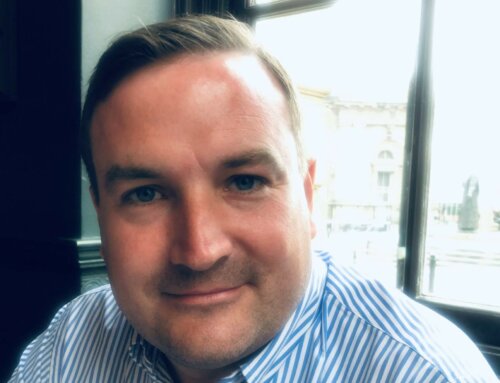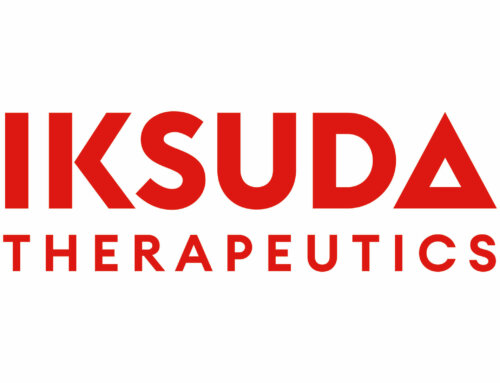As we gear up to International Women’s Day (8 March) and British Science Week (6 – 13 March) we chat to some of our inspirational tenants and collaborators about being a woman working in Science, Technology, Engineering or Maths.
Today, we’re in conversation with Dr Amy Heptinstall, a development chemist with Biosphere tenant, Iksuda Therapeutics. Iksuda is developing next-generation Antibody Drug Conjugates (ADCs) for the treatment of difficult to treat, solid cancers.
Firstly, can you tell us a little bit about what you do?
ADCs are a type of cancer treatment which combine a monoclonal antibody (an antibody produced by a single clone of cells) and a tumour-killing payload (or toxin) via a linker. The monoclonal antibody is specific for the tumour and delivers the payload directly to the cancer cells. This selective approach results in superior efficacy and fewer side effects for patients. Iksuda intends for its novel ADCs to treat the broadest patient population possible. I am a synthetic chemist, which means I work predominantly in the laboratory designing and making the linker and toxin components of ADCs. I then hand the material over to the Development Scientists for bioconjugation (or bonding) to the antibodies and for testing.
What does your role involve on a day to day basis?
I work in the laboratory making, purifying and analysing novel compounds using organic chemistry techniques. Before synthesis begins, compounds need to be designed using literature research and by participating in scientific discussion. Iksuda works with a number of collaborators from industry and academia, whom I liaise with regularly, and report on the work being undertaken. I am also involved in training of employees and students, maintaining equipment, purchasing, and writing risk assessments and standard operating procedures. Working with toxins is very high risk and several health and safety measures are in place to reduce exposure of scientists to the toxins.
Why STEM?
When I was in school, I was always interested in science and maths, mostly because I was good at it! I first started to think about my career in high school when I went to work with my mum on a ‘Take Your Daughter To Work Day’, which I’m sure wouldn’t happen now we’re fifteen years down the line! She worked in payroll for the local council and if I’m being honest, I was completely bored. I said that day that I would never do a job where I was sat at a desk all day and I stand by that!
I did well in my GCSEs and I went on to do A levels in Biology, Chemistry, Physics, Maths and Further Maths. My comprehensive school didn’t have the best academic careers support, let’s say, and I was only the second in my family with a plan to go to university, after my aunt who studied Medicine. I therefore planned to follow in her footsteps and do the same, not knowing what other options were out there for me. I applied to four medical schools and put Medicinal Chemistry at Newcastle University as my back up choice, basically because it had ‘medicine’ in the title, and I thought I might be able to transfer to Medicine or apply afterwards. Of course, I didn’t get on to any Medical degree programmes. Following my Oxford interview, I was sent away to get more life experience. Edinburgh offered me a place on Biomedical Science instead. So I decided to go have a party in Newcastle instead, and come results day, I got all A’s besides Chemistry, in which I got a B, so I’d have been turned away from Medicine based on my grades even if I had gotten an offer.
I’d actually always been naturally better at Maths and Physics than Chemistry, but on starting my degree, I fell in love with the subject and realised I’d only chosen Medicine because I didn’t know what else I could go into. I stayed for my Masters, worked as a Technician, then went back to do a Medicinal Chemistry PhD entitled ‘Small Molecule Kinase Inhibitors for Anti-Cancer Therapy’ (Cancer Research). Upon completion of this, I began working for Iksuda. It’s great to be working in a field that has a therapeutic, real-world application, in a stimulating environment. And I’m definitely not sat at my desk all day!
A recent study by Teach First found that more than half the population couldn’t name a female scientist. Can you tell us about someone who inspired you in STEM – famous or otherwise – and why?
My biggest inspirations came once I had started my chemistry degree and began learning about the work going on within the university. My Masters supervisor Dr Celine Cano and the postdoctoral scientist in the lab at the time, Dr Stephanie Myers, were hugely inspiring to me and I don’t think I would have ever considered doing a PhD if not for their support and if they hadn’t been there as role models.
What would you say to inspire a young woman considering a career in STEM? Any tips?
Basically, why not?! If you have a passion for the subject, then there is nothing stopping you. The number of women in STEM is increasing all the time and professional bodies such as the Royal Society of Chemistry are exploring ways to retain women in scientific roles and to promote equal opportunities.
I was always worried about my career progression being a woman in Chemistry specifically because there are parts of my job that cannot be done whilst pregnant, which can then affect the output of a small company or academic group. Actually, I am now pregnant, and there have not been any of the issues I was worried about, and I don’t foresee any issues coming back and returning to my role following my maternity leave.
And finally, why is Newcastle and the wider region such a great place to work in STEM?
Newcastle is such a friendly city; I loved the place when I came on my first university open day and I have never left. There is so much to do in the city but it’s also so easy to get to the coast or into the countryside. STEM jobs are increasing in the area and I’m really excited about the completion of Newcastle Helix and the opportunities it will bring to the region. In the therapeutic area, we have three fantastic hospitals – the RVI, the National Innovation Centre for Ageing and the Freeman Hospital with the clinical trials unit – which have close ties to the universities and businesses. It’s an inspiring place to be doing cancer research!
The Biosphere is hosting a celebratory #WomenInSTEM event on Friday 6th March to mark International Women’s Day. Click here for more information and to sign up.



